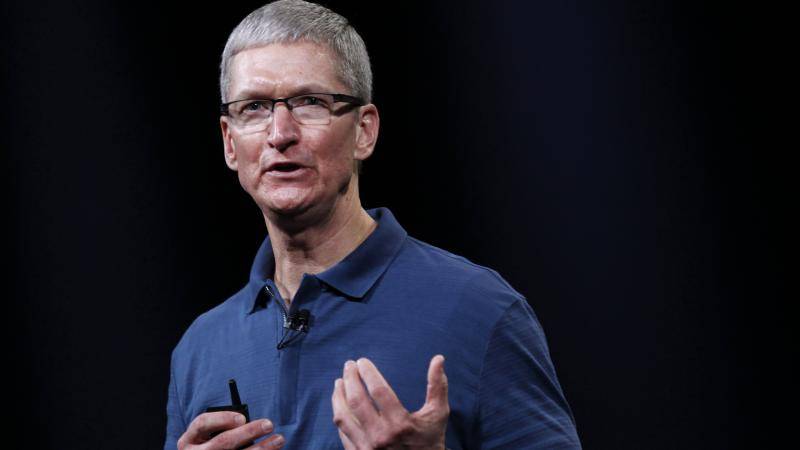
Tim Cook took the helm of Apple on August 24, 2011. Since then, on average, Cook has increased Apple’s market value by $110 million a day. Its shares closed yesterday a hair above $461, up 23% over his tenure so far.
Sure, it’s been a bit of a bumpy ride along the way — and a particularly painful one for those who purchased Apple stock last year in the neighborhood of $705, its all-time high. Fair enough. Yet the media, Wall Street — even Apple employees — seem to overlook a lot of what Cook has achieved.
In its most recent quarterly earnings report, Apple posted record revenues, $54.5 billion, and record quarterly net profits, $13.1 billion. Apple sold a record number of iPhones for the quarter — 47.8 million. The company sold a record number of iPads for the quarter as well — 22.9 million.
Apple generated over $23 billion in cash flow for this first quarter, an astounding number. Indeed, Apple has at least $137 billion in cash reserves. Long thought of as a US-focused company, international sales now account for 61% of Apple’s revenues. Apparently, this is not good enough. The drumbeat of negativity continues. Consider this sampling:
- The Last 6 Times Tim Cook Has Talked, Apple’s Stock Has Dropped
- With Apple Profit Falling, Board Should Replace Tim Cook with Jony Ive
- Tim Cook Negligent on Defending Apple’s Share Price – Price Bordering on Perverse
- Ex-Apple Employee: I Worry That Tim Cook Is Too Nice
- Apple CEO Tim Cook’s approval rating drops
- Apple’s first quarter of negative income growth since 2003
Following the legendary Steve Jobs is a difficult task. But despite Cook’s rather exemplary job running the world’s largest tech company, many insist upon viewing him in starkly negative terms.
Tim Cook Stops The Buck
Cook has certainly faced his share of adversity, and he’s typically responded quickly and openly. When Apple was singled out for working conditions at its Chinese contractor Foxconn over the manufacture of iPhones and iPads, Cook made a highly public visit to the country. Cook also began working with the Fair Labor Association (FLA) to conduct audits of Apple suppliers, including Foxconn, stating that:
We believe that workers everywhere have the right to a safe and fair work environment, which is why we’ve asked the FLA to independently assess the performance of our largest suppliers.
Cook also stated that Apple’s suppliers were to provide full cooperation and “unrestricted access” to the FLA.
Following blistering press over the flubbed launch of Apple Maps, Cook was contrite and open:
At Apple, we strive to make world-class products that deliver the best experience possible to our customers. With the launch of our new Maps last week, we fell short on this commitment. We are extremely sorry for the frustration this has caused our customers and we are doing everything we can to make Maps better.
In a corporate statement signed by Cook, he also stated the company’s ongoing commitment to meeting customer expectations — even suggesting users consider competing products:
While we’re improving Maps, you can try alternatives by downloading map apps from the App Store like Bing, MapQuest and Waze, or use Google or Nokia maps by going to their websites and creating an icon on your home screen to their web app.
Everything we do at Apple is aimed at making our products the best in the world. We know that you expect that from us, and we will keep working non-stop until Maps lives up to the same incredibly high standard.
Cook has also sought to improve the environment inside Apple. One example: soon after being named CEO, Cook implemented a company charitable giving program at Apple.
I am very happy to announce that we are kicking off a matching gift program for charitable donations. We are all really inspired by the generosity of our co-workers who give back to the community and this program is going to help that individual giving go even farther. Apple will match your gift dollar-for-dollar, up to $10,000 annually.
Not long after the announcement, Cook donated $100 million of his own money — $50 million to Stanford Hospital and $50 million to Project RED, which works to combat the spread of AIDS, tuberculosis and malaria.
Last October, Cook announced significant management changes within Apple designed to enhance “collaboration” across Apple hardware, software and services:
We are in one of the most prolific periods of innovation and new products in Apple’s history. The amazing products that we’ve introduced in September and October, iPhone 5, iOS 6, iPad mini, iPad, iMac, MacBook Pro, iPod touch, iPod nano and many of our applications, could only have been created at Apple and are the direct result of our relentless focus on tightly integrating world-class hardware, software and services.
Cook also promoted the highly regarded Jony Ive, placing him in charge of design for both hardware and software.
Despite these efforts, Cook is still largely held to a unattainable standard — even by Apple employees, it seems. In its recent annual CEO approval rating survey, for example, Glassdoor announced this week that Tim Cook’s employee approval ranking had fallen from #1 in 2011 to #18 in 2012. Tech CEOs who placed better than Cook included:
- Mark Zuckerberg, Facebook (#1)
- Larry Page, Google (#11)
- Marc Benioff, Salesforce (#13)
If bloggers, Wall Street analysts and even Apple employees are losing confidence in Cook, Apple customers are clearly not, driving record sales and revenues for the company — and once again ranking iPhone tops in customer satisfaction.
Nor are Cook’s peers uncertain of his abilities. In a recent global survey of business directors and executives, Fortune found that Apple was the world’s “most admired company,” the world’s “most admired in innovation,” and “number 1 in product quality.”
Take that, naysayers.
Image of Tim Cook courtesy of Reuters

















